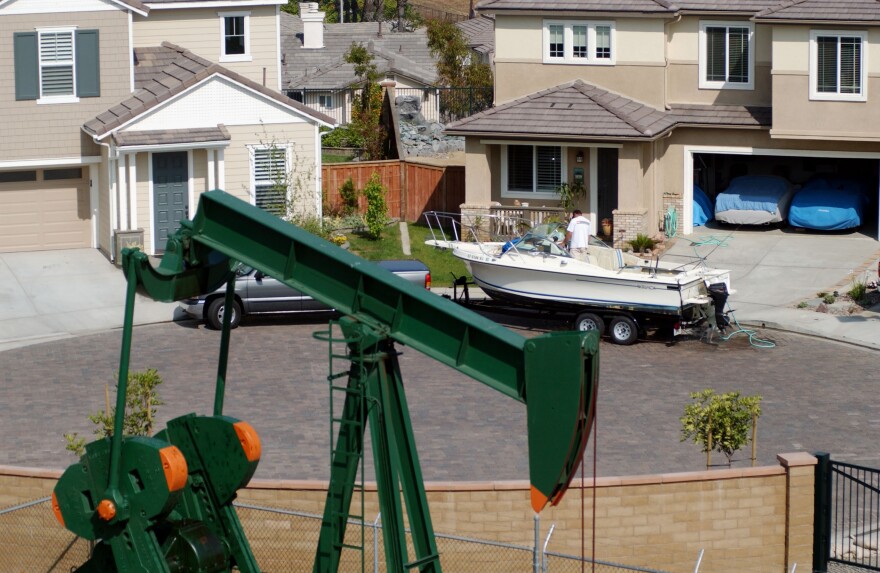This story is free to read because readers choose to support LAist. If you find value in independent local reporting, make a donation to power our newsroom today.
This archival content was originally written for and published on KPCC.org. Keep in mind that links and images may no longer work — and references may be outdated.
LA to study banning oil production around homes, schools, hospitals and other public places

The city of Los Angeles is considering taking its boldest step yet towards restricting oil and gas development. On Wednesday, city council president Herb Wesson introduced a motion calling for a study of what it would take to shut down all oil and gas wells near homes, schools, hospitals, parks and other public places.
Wesson said he’d been hearing stories for years from constituents who believed that their health problems were either caused or exacerbated by living alongside oil and gas facilities. They complained about noxious fumes, loud noises, and oil mist coating houses and cars.
“And because of these series of complaints that have gone on for years, I personally got tired of listening to them, and figured it was time for action,” Wesson said. “The number one goal is to make sure we keep the people in our community safe.”
Wesson’s study will look at the feasibility of creating of a buffer zone, or setback, around places where people live and gather. Inside the buffer zone, no oil development and production would be allowed.
Community activists are hoping for a 2,500-foot setback. Because there is so much residential development around oil fields in Los Angeles, a setback that large could cause 90 percent of the city’s 322 active wells to be shut down, according to the California Department of Oil Gas and Geothermal Resources (DOGGR).
That doesn’t go far enough for Monic Uriarte with the environmental justice campaign People Not Pozos. She'd rather see 100 percent of the wells shut down.
“We don’t need any oil drilling in urban areas,” she said. "Bottom line."
The last time the city council tried to regulate urban oil drilling in 2014, it specifically targeted hydraulic fracturing, or “fracking,” and other extraction processes. The city council asked for a study on the feasibility of banning fracking, but it ended up dropping the idea when the city planning department concluded it did not have the expertise to evaluate restrictions on extraction methods.
In October, the city hired a petroleum administrator to help with such evaluations.
Martha Dina Argüello, executive director of Physicians for Social Responsibility, said community activists have moved past fracking and now want to end all oil production in the city entirely. She said LA’s stated vision of a sustainable city is incompatible with urban oil development.
“The city has said, ‘We want to be fossil-fuel free. We want to address climate change,’” she said. “Well, they need to address it where Angelenos breathe. It’s easy to fight the fight for climate change in the abstract. We should start the fight for climate here where the air is worst.”
If LA tries to shut down existing oil wells, it will not be an easy fight. Most states and municipalities have forward-looking petroleum setbacks – they apply to future drilling and are not used to phase out existing wells. Carol Booth with the Interstate Oil and Gas Compact Commission, a coalition of oil producing states that gathers information on state statutes, said she has never heard of a city or state passing a retroactive setback.
The city could also be on shaky legal ground for illegally taking private property, said Sabrina Lockhart with the California Independent Petroleum Association, which represents small oil producers. In addition, Lockhart said reducing oil production in LA would likely mean increasing imports from elsewhere.
“The less oil we produce here under the strictest standards in the nation means we have to obtain the rest of our energy from imports that don’t follow the same environmental protections that we have here,” she said.
The setback study now heads to the city council’s health committee. Once approved, the planning department, city attorney and petroleum administrator have 90 days to complete it.







